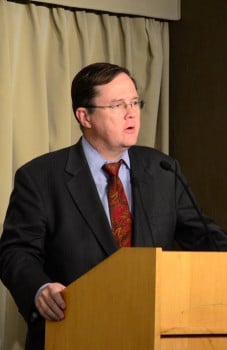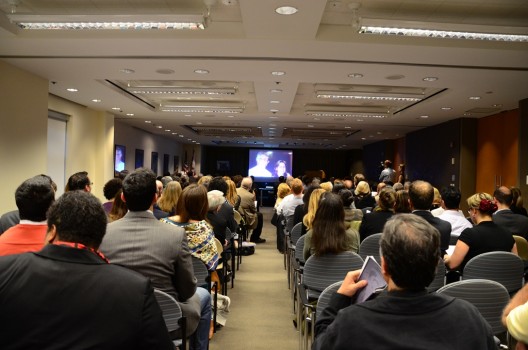In Washington DC on Monday, speakers at a forum to commemorate the fifth anniversary of the imprisonment of the seven Baha’i leaders said their situation reflects all too well the repression of religious minorities generally in Iran today.
“This is a government that also prevents Sunnis from worshiping, flogs Sufis, and detains Zoroastrians without charge simply for who they are,” said Thomas O. Melia, a Deputy Assistant Secretary of State in the Bureau of Democracy, Human Rights and Labor at the US Department of State, referring to the Iranian government and its human rights policies.
“This is a government that raids house churches and arrests Christian leaders for their activities. The government discriminates harshly also against Jews and confiscates property from a variety of religious communities,” he said on 6 May, at the Carnegie Endowment for International Peace.
“So just as we should understand the plight of these seven men and women as emblematic of the larger situation for Baha’is in Iran, it is also a reminder of the situation for lots of religious communities in Iran – and around the world.”
Katrina Lantos Swett, chair of the United States Commission on International Religious Freedom, said that since Iran’s 1979 Revolution, “no group has been immune from persecution.”
“Every religious group has seen some of its members suffer from Tehran’s oppressive policies,” she said, noting that the USCIRF had issued a major report criticizing Iran for its widespread repression of religious freedom the week before. She added, however, “no group has suffered more than the Baha’is.”
“What these prison terms for the seven Baha’i leaders really signaled was the Iranian government punishing people for daring to be Baha’is.
“Simply stated, here was a theocratic government doing everything in its power to prevent a faith community – 300,000 strong – from iving in freedom and peace. Why? Because this community, by daring to follow the dictates of their conscience, found itself on the wrong side of the government’s theology,” said Dr. Swett.
Roxana Saberi, an American journalist who was accused of spying by Iran and for three weeks in 2009 shared a cell with Fariba Kamalbadi and Mahvash Sabet in Evin Prison, spoke about her time with the two Baha’i women leaders, saying they taught her about having a positive attitude in the face of adversity.
“They tried to make the most of every day in prison,” said Ms. Saberi. “For example, they exercised in place every day. There wasn’t a gym they could go to. They discussed the books they were allowed to read, and asked me to teach them English phrases. So I taught them phrases they would need to know to shop, to travel, to cook….”
“Their positive attitudes rubbed off on other women prisoners and helped strengthen their spirits too. Word travelled through the women’s ward quickly that if you were lucky, you would get to room with the Baha’is, because they would help you lift your spirits and get through the days faster.”
At one point, discouraged and hating her jailers, Ms. Saberi asked the two Baha’is how they maintained such positive attitudes, even towards the officials who had imprisoned them.
“’We don’t hate them. We forgive them. We believe in love and compassion for all humanity, even for those who wrong us. We don’t want to become like them. We hope God will help us show them a better way,’” said Ms. Saberi, quoting their words.
Ken Bowers, secretary of the Baha’i community of the United States, described in detail the conditions that the seven are enduring in prison. “Tonight we let these seven individuals know that they have not been forgotten.”
The evening was emceed by actor Rainn Wilson, who is himself a Baha’i.
The event received extensive coverage in the news media. This included broadcast coverage on CNN, as well as print, web or wire service coverage in The Washington Post, AFP, Iran Focus, and Roll Call. The event was also reported on by the Foreign Policy Association.
The entire event was videotaped and can be viewed at this link.

